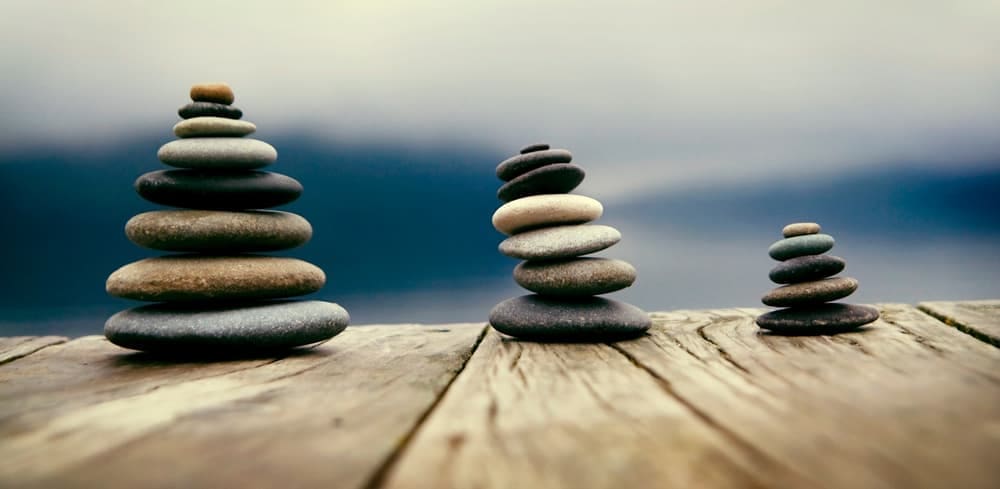“Happiness is not a matter of intensity
but of balance, order, rhythm, and harmony.”
— Thomas Merton
• Does your day have a rhythm?
• Has it changed since the onset of the pandemic? How?
• Do you know your optimum time for getting things done?
• Do you sleep well, awake, rested, and consistently?
• You may be asking, “Why all the questions, Leslie?”
I — who spends more time alone in my home with my dog pack thinking and observing myself, the dogs, and the outside environment — was smiling at how my morning routine has become almost robotic when I am home alone. I even take most of these habits with me when I travel.
My day is very paced, starting at the end of each day with a recap of that day’s and week’s events and commitments. I always write out the next day’s plan the night before. I sleep better when I know what needs to be accomplished and have a plan for how that will happen. Then I can let go of the world and find rest.
If I have too many loose ends — or not enough time to accomplish everything with a deadline — I will wake up in the middle of the night, unable to go back to sleep, and feel compelled to tackle the list.
• Can anyone relate?
I am the master of my time. And yet, every day my commitments of time rearrange themselves with the input of everyone else. So, am I really the master of my time?
Time is finite. It is also one of the resources that is given equitably. Everyone receives the same 24-hours every day. What differentiates us from one another is how we use our time.
Time and experience have taught me that planning one’s time is essential. And the establishment of clear priorities is key to getting things done that matter. This is a framework for one’s personal schedule, the charter of a team you serve on, for any initiative at home or work, and for the entire organization. Planning the use of your time and resources with respect to your mission and goals is a process that applies to individuals, teams, and organizations.
• How much time do you spend planning your use of time?
• If you had to complete a pie chart of your daily activities and use of time, what would it look like?
• How frequently does it change?
• How does it change when you change?
• On vacation?
• When traveling?
• As you change your job or retire?
Some days it feels like every minute counts. I can’t live everyday like that – it is too stressful. I love the weekend — I still have my lists and routines but I feel unrushed and have fewer interruptions.
During my life, I may have depleted my finances but I don’t waste time. I know its value. And as I age, time feels even more valuable.
• What relationship do you have with time?
• What are the lessons you have learned that help you to be most effective in utilizing this most important commodity?
I have learned to do the hardest thing first. I find my day goes more smoothly.
I am a morning person, so I schedule time for thinking and writing projects for the early morning.
I understand that procrastination is not a luxury that I have. If I procrastinate, it always results in stress and an effort that could have been made better if done at the right time.
Coordinating time and schedules with others is very challenging, especially when working remotely and need to coordinate.
And I trust that every plan will change. So, flexibility is a requirement if I am to keep in good spirits.
I tend to review backwards to plan forwards. The time quadrant from Stephen Covey’s book — “The Seven Habits of Highly Effective People” — that supports the habit of ‘Putting first things first’ taught me to evaluate activities on scales of Importance and Urgency. It is a framework embedded in my thinking about planning and time.
Which one is most like you? A “Good enough” or “It has to be done perfectly” person? That distinction will influence how you use time.
I don’t want to have any regrets — or should-haves, could-haves, or would-haves. I have learned that those negative feelings correspond directly to my planning, use of time, and clarity of priorities. I will never regret the time I spent caring for my mother during the last year of her life. Or the many responsibilities that come with having a dog pack. Or the unplanned interruption of a puppy litter last summer. Each of those situations caused me to change my plan, yet each experience was rich with memories that are still most valuable to me.
Stephen Covey once said, “I never met a person who on their deathbed said that they needed to spend more time at work.”
I ask myself these questions every day:
• How do I want to spend my time and with whom?
• Where do I want to use my strengths and make my contribution?
The blessing is that every day I am given a fresh day to use with care.
May each of us be given the days we need to make the contributions we wish for. And may we live our lives to the fullest.
Happy Earth Day!
Leslie
“I have always been delighted at the prospect of
a new day, a fresh try, one more start,
with perhaps a bit of magic waiting
somewhere behind the morning.“
— J.B. Priestley






Recent Comments